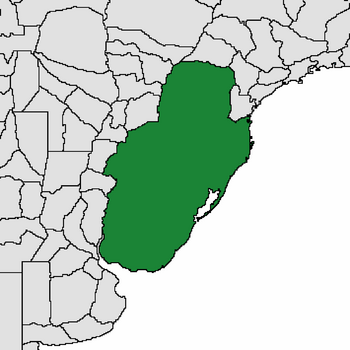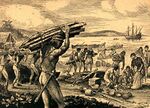Trenado
This article is incomplete because it is pending further input from participants, or it is a work-in-progress by one author. Please comment on this article's talk page to share your input, comments and questions. Note: To contribute to this article, you may need to seek help from the author(s) of this page. |
Conservative Republic of Trenado República Conservadora de Trenado | |
|---|---|
| Motto: “Prosperidade é o Caminho Para a Vitória” (Portuguese) “Prosperity is the Way to Victory” (English) | |
| Anthem: Sentinelas Trenadianas | |
 | |
| Capital | Osório |
| Largest city | Porto Alegre |
| Official languages | Portuguese Spanish |
| Ethnic groups (2017) | 64% White 17% Black 10% Pardo 9% Asian |
| Demonym(s) | Trenadian |
| Government | Federal republic |
• President | Roque Aguilar |
• Vice-President | Andrea Olímpia |
| Establishment | |
• Declaration of independence from the Spanish Empire | 3rd May, 1807 |
• Autonomy recognized | 8th August, 1808 |
| Area | |
• Total | 795,646 km2 (307,201 sq mi) (39) |
| Population | |
• 2016 estimate | 38609901 (37) |
| GDP (PPP) | 2018 estimate |
• Total | 2527353 |
• Per capita | 56032 |
| GDP (nominal) | 2015 estimate |
• Total | 752364 |
• Per capita | 52013 |
| HDI (2017) | 0.899 very high |
| Currency | Trenadian real (T$) (TNR) |
| Time zone | UTC-3 (UTC) |
| Date format | dd-mm-yyyy |
| Driving side | right |
| Calling code | +598 |
| ISO 3166 code | TRE |
| Internet TLD | .tr |
The Conservative Republic of Trenado (Portuguese: República Conservadora de Trenado), usually known as Trenado is a sovereign nation located in South America, constituted as a federation with 9 provinces. The country is known for its economic potency, industrial power and diplomatic popularity. From 1974 to 2018, Trenado was part of the Federation of Conservative Nations, but left due to a lot of trouble envolving partisanship and controversial events.
History
Pre-colonial period
Around 23 A.C., the first few indigenous communities in Trenadian territory started to form, including the Brugrenenses, which were fundamental for the country's history after having discovered rich material for trading with other communities (and, later on, with other countries).
The Brugrenenses still are a huge part of the nation's history, by building important monuments and places, even without many resources for that. However, this pre-colonial period didn't last for long, considering it'd end around the 16th century.
Colonial period (1512-1763)
In 1512, following the events of the Great Navigations in America, the Spanish found a territory in the south of what the Portuguese had found, that territory being around the region of current city Ivoti. Taking advantage of the Treaty of Tordesillas, they decided to take over that small southern part of Brazil and made it their colony. With that event, the Brugrenenses were extinct, while very few of them moved to an even southern region that wasn't being invaded yet. As a colony of the Spanish Empire, this was one of the longest phases of Trenadian history, lasting almost exactly 250 years. However, it would end in 1763, when the Trenadians became officially a dominion of the empire.
The Dominion of Trenado (1763-1807)
As a dominion of the Spanish, the region got richer due to the production of raw material such as coffee and sugar, however was also one of the powerhouses for slave-trading not only for them, but also for other European empires to make more money off Trenado. The official flag given had 4 stars, representing the four rulers of the Trenadian colony who passed away between 1512 and 1763. The dominion period is often disregarded on its own, and rather considered a big step forward for the nation to gain its independence. The process of sovereignty started in the early 19th century, being led majorly by Román Bocanegra.
The Trenadian Revolution (3rd May, 1807)
In May, 1807, Román and a group of rebellious soldiers marched for 104 kilometers, from Osório to Porto Alegre to shout an independence chant from the Spanish Empire, and then fire towards the windows of the main Trenadian palace using shotguns.
Prosperidade é o caminho para a vitória! Nos devolvam nossa liberdade, pois não seremos mais escravos de totalitários!
— Román Bocanegra
The former phrase became the motto of the nation, after the Spanish aristocracy knew it'd be dangerous to keep them as a dependent territory, and gave in, consolidating the Trenadian independence, on the night of the 3rd of May. Here starts another chapter in the country's history.


